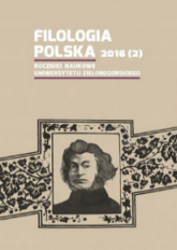Słoworody – the key to the history of Slavs in Mickiewicz Paris lectures
Keywords
Abstract
Mickiewicz’s interests in Slavic languages, their roots, evolution, and the etymology of words are related to the romantics’ programmatic tendency to reconstruct the tradition and define the identity of nations basing on the spiritual or material traces of their historical activities. The poet was inspired by works of linguists and the so-called philosophers of the language, who drew far-reaching conclusions from coincidental formal similarities between words. Merging and developing various, often farfetched, etymological concepts, Mickiewicz created a specific poetical idea of Slavdom. Its fundament was a language-derived myth of the folk, which is on the one hand conquered, abused, enslaved, and yet full of spirit and joyful (sclavi saltantes). On the other hand the folk is marked by the “word” (mother tongue) with splendor of dignity, historic awareness. The folk is also predestined to fulfill a religious-civilizational mission whose plan and goal are revealed through the Word of God. The poet perceives the language as the key to encrypt the history of Slavs hidden there. History, meanwhile, has a double meaning: it is both a legend set in an unspecified past and a prophetic prediction of what is about to happen in the future.
References
LITERATURA CYTOWANA
Boryś W., Słownik etymologiczny języka polskiego, Kraków 2010.
[Google Scholar]
Brodziński K., O klasyczności i romantyczności tudzież o duchu poezji polskiej, 1818.
[Google Scholar]
Brückner A., Słownik etymologiczny języka polskiego, Warszawa 1993.
[Google Scholar]
Calderon de la Barca Don Pedro, Lekarz swojego honoru, tragedia w 5 aktach, z dzieł... przez. J. N. Kamińskiego dla teatru polskiego przerobiona, Lwów 1927.
[Google Scholar]
Chodakowski Z. D., O Sławiańszczyźnie przed chrześcijaństwem oraz inne pisma i listy, oprac. J. Maślanka, Warszawa 1967.
[Google Scholar]
Desperez H., Polacy w rewolucji europejskiej, „Revue des Deux Mondes”, 15 sierpnia 1849, [w:] Adam Mickiewicz w oczach Francuzów, oprac. Z. Mitosek. przeł. R. Forycki, Warszawa 1999.
[Google Scholar]
Dębołęcki W., Wywód jedynowłasnego państwa świata, w którym pokazuje x. Wojciech Dębołęcki [...], że nastarodawniejsze w Europie Królestwo Polskie lubo Scytyckie samo tylko na świecie ma prawdziwe sukcesory Jadama, Setha i Japheta w panowaniu światu od Boga w Raju postanowionym i że dlatego Polaki Sarmatami zowią. A gwoli temu i to się pokazuje, że język słowieński pierwotny jest na świecie, Warszawa 1633.
[Google Scholar]
Długosz-Kurczabowa K., Słownik etymologiczny języka polskiego, Warszawa 2003.
[Google Scholar]
Długosz-Kurczabowa K., Wielki słownik etymologiczno-historyczny języka polskiego, Warszawa 2008.
[Google Scholar]
Dobrovský J., Historisch-kritische Untersuchung, woher die Slawen ihren Namen erhalten haben, „Abhandlungen einer Privatgesellschaft in Bohmen, zur Aufnahme der Mathematik, der vaterlandischen Geschichte, und der Naturgeschichte”, bd. 6, Prag 1784.
[Google Scholar]
Greckie i łacińskie źródła do najstarszych dziejów Słowian, cz. 1, przeł. i oprac. M. Plezia, Poznań-Kraków 1952.
[Google Scholar]
Herder J. G., Myśli o filozofii dziejów, przeł. J. Gałecki, [w:] idem, Wybór pism, oprac. T. Namowicz, Wrocław 1987.
[Google Scholar]
Humboldt W., Berichtigung und Zusätze zu Adelung Mithridates über die cantabrische oder baskische Sprache (1817).
[Google Scholar]
Humboldt W., Prüfung der Untersuchungen über die Urbewohner Hispaniens vermittelst der baskischen Sprache (1821).
[Google Scholar]
Humboldt W., Rozmaitość języków a rozwój umysłowy ludzkości, przeł. E. M. Kowalska, Lublin 2001.
[Google Scholar]
Humboldt W., Über die Verschiedenheit des menschlichen Sprachbaues und ihren Einfluss auf die geistige Entwickelung des Menschengeschlechts, Berlin 1836.
[Google Scholar]
Humboldt W., Ueber den Dualis (1828).
[Google Scholar]
Humboldt W., Ueber die Kawisprache auf der Insel Jawa (t. 1-3, 1836).
[Google Scholar]
Janion M., Niesamowita Słowiańszczyzna. Fantazmaty literatury, Kraków 2007.
[Google Scholar]
Jordanes, De origine actibusque Getarum, Viennae 1848.
[Google Scholar]
Kamiński J. N., Czy nasz język jest filozoficzny?, „Haliczanin” 1830, t. 1.
[Google Scholar]
Kamiński J. N., Wywód filozoficzności naszego języka, „Haliczanin” 1830, t. 2.
[Google Scholar]
Kawyn S., Mickiewicz w oczach współczesnych. Studia i szkice, Warszawa 2001, s. 184.
[Google Scholar]
Konopnicka M., Sclavus saltans, [w:] Poezje. Seria druga, Warszawa 1883.
[Google Scholar]
Linde S. B., Słownik języka polskiego, wyd. 2, t. 5, Lwów 1859.
[Google Scholar]
Monumenta Germaniae historica, t. 2, Hannoverae 1829.
[Google Scholar]
Naruszewicz A., Historia narodu polskiego, t. 1, ks. 1, Warszawa 1830.
[Google Scholar]
Pol W., Dzieła poetyckie, oprac. J. Sroczyński, M. Wiśniowiecki, t. 2, Stanisławów 1904.
[Google Scholar]
Potocki S., O wymowie i stylu, t. 1, cz. I, Warszawa 1815.
[Google Scholar]
Prelekcje paryskie, wykład 6, kurs III.
[Google Scholar]
Prokopiusz z Cezarei, Historia wojen, przeł. D. Brodka, t. 1, Kraków 2013, t. 2, Kraków 2015, Publius Cornelius Tacitus, De origine et situ Germanorum (O pochodzeniu i kraju Germanów), ok. 98 r..
[Google Scholar]
Šafařik P. J., Slowanské starožitnosti, Praha 1837.
[Google Scholar]
Schlegel F., Philosophische Vorlesungen, insbesondere über Philosophie der Sprache und des Wortes: geschrieben und vorgetragen zu Dresden im December 1828 und in den ersten Tagen des Januars 1829, Wien 1830.
[Google Scholar]
Sinko T., Mickiewicz i antyk, Wrocław-Kraków 1957, s. 523.
[Google Scholar]
Szafarzyk J., Starożytności słowiańskie, przeł. H.N. Bońkowski, Poznań 1844.
[Google Scholar]
Szajnocha K., Lechicki początek polski, [w:] idem, Lechicki początek polski, Lwów 1858.
[Google Scholar]
Witkowska A., „Ja głupi Słowianin”, Kraków 1980.
[Google Scholar]
Preview
Downloads
Published
How to Cite
Issue
Section
Categories
Copyright & License

This work is licensed under a Creative Commons Attribution-NonCommercial-NoDerivatives 4.0 International License.
Copyrights (a). In principle, authors who are not employed by the University of Zielona Góra retain the copyright, including publishing rights to the articles, without restrictions.
Copyrights (b). In principle, authors who are employed by the University of Zielona Góra, do not retain the copyright, including publishing rights to the articles. In such cases the copyright holder is the University of Zielona Góra.
Print ISSN
2450-3584-
Abstract158











































